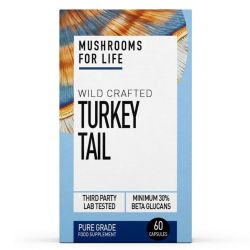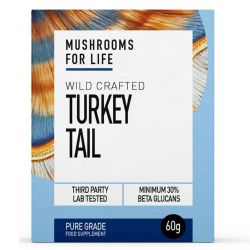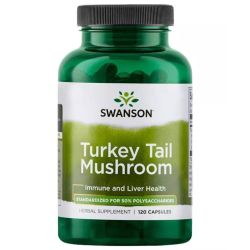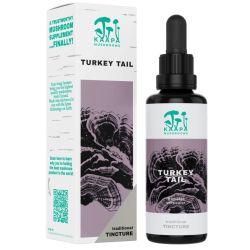Turkey Tail Mushroom Supplements
Turkey Tail mushrooms are popularly taken in supplement form; either as a powder or as capsules. Discover our range of Turkey Tail Mushroom products below.
All you need to know about Turkey Tail
What are Turkey Tail Mushrooms?
Turkey tail mushrooms, scientifically known as Trametes versicolor or Coriolus versicolor, are a type of polypore mushroom that grows widely in forests around the world. They are named for their resemblance to the tail feathers of a strutting turkey. These mushrooms are known for their striking and colorful concentric bands of various hues, which give them their distinct appearance.
What do Turkey Tail Mushrooms do?
Some of the key bioactive compounds found in turkey tail mushrooms include:
-
Polysaccharides: Turkey tail mushrooms are rich in polysaccharides, particularly beta-glucans. Beta-glucans are complex carbohydrates that have been extensively studied for their immunomodulatory properties. They help modulate the immune system, enhance immune response, and support overall immune function.
-
Triterpenoids: Turkey tail mushrooms contain various triterpenoids, including steroids and sterols. These bioactive compounds have been studied for their potential anticancer, anti-inflammatory, and antioxidant properties. Triterpenoids found in turkey tail mushrooms may help inhibit tumor growth, reduce inflammation, and neutralize free radicals.
-
Phenolic Compounds: Turkey tail mushrooms contain phenolic compounds, including phenolic acids and flavonoids. These compounds have antioxidant properties and help neutralize harmful free radicals, reduce oxidative stress, and protect cells from damage.
-
Lectins: Turkey tail mushrooms contain lectins, which are proteins that bind to specific carbohydrates. Lectins have been studied for their potential immunomodulatory effects and may help enhance immune function and support overall health.
-
Polysaccharide-Protein Complexes: Some bioactive compounds in turkey tail mushrooms exist as polysaccharide-protein complexes. These complexes may exhibit synergistic effects and enhance the therapeutic properties of turkey tail mushrooms, particularly in supporting immune function and combating oxidative stress.
-
Nucleosides: Turkey tail mushrooms contain nucleosides, including adenosine and uridine. These compounds have been studied for their potential immunomodulatory and anti-inflammatory effects, which may contribute to the overall health benefits of turkey tail mushrooms.
-
Other Bioactive Compounds: Turkey tail mushrooms also contain other bioactive compounds, such as ergosterol, a precursor to vitamin D, and various vitamins, minerals, and trace elements. These nutrients contribute to the overall nutritional value of turkey tail mushrooms and support various physiological functions in the body.
What are the benefits of taking Turkey Tail Mushrooms?
Some of the potential benefits associated with Turkey Tail mushrooms include:
-
Immune Support: Turkey Tail mushrooms are rich in beta-glucans and other polysaccharides, which have been shown to modulate the immune system and enhance immune function. Regular consumption of Turkey Tail mushrooms may help support overall immune health and increase resistance to infections.
-
Antioxidant Protection: The phenolic compounds and other antioxidants present in Turkey Tail mushrooms help neutralize harmful free radicals and reduce oxidative stress in the body. By scavenging free radicals, Turkey Tail mushrooms may help protect cells from damage and lower the risk of chronic diseases.
-
Anti-Inflammatory Effects: Compounds found in Turkey Tail mushrooms, such as triterpenoids and polysaccharides, have been studied for their potential anti-inflammatory properties. By reducing inflammation in the body, Turkey Tail mushrooms may help alleviate symptoms associated with inflammatory conditions and promote overall health.
-
Potential Anticancer Properties: Some research suggests that Turkey Tail mushrooms may have anticancer properties and could be used as adjunct therapy in cancer treatment. Compounds found in Turkey Tail mushrooms, including polysaccharides and triterpenoids, have been studied for their ability to inhibit tumor growth, enhance immune response, and improve the effectiveness of chemotherapy and radiation therapy.
-
Digestive Health: Turkey Tail mushrooms contain dietary fiber and other compounds that support digestive health. By promoting the growth of beneficial gut bacteria and improving digestion, Turkey Tail mushrooms may help maintain a healthy digestive system and reduce the risk of gastrointestinal disorders.
-
Skin Health: Turkey Tail mushrooms are sometimes used in skincare products for their potential benefits to skin health. Compounds found in Turkey Tail mushrooms, such as polysaccharides and antioxidants, may help hydrate the skin, reduce inflammation, and promote collagen production, leading to improved skin texture and appearance.
-
Overall Wellness: Regular consumption of Turkey Tail mushrooms may contribute to overall health and well-being. By supporting immune function, reducing inflammation, and providing antioxidant protection, Turkey Tail mushrooms help maintain a healthy balance within the body and support optimal physiological function.
How long does it take Turkey Tail Mushrooms to work?
The time it takes for Turkey Tail mushrooms to produce noticeable effects can vary depending on several factors, including the individual's health status, the specific health condition being targeted, the dosage used, and the form in which Turkey Tail mushrooms are consumed (e.g., fresh, dried, supplement).
-
Type of Benefits:
- Immune Support: Some individuals may experience improvements in immune function relatively quickly after incorporating Turkey Tail mushrooms into their routine. Others may require longer-term consumption to notice significant changes in immune health.
- Antioxidant Protection: The antioxidant properties of Turkey Tail mushrooms may provide immediate benefits by scavenging harmful free radicals in the body. However, long-term consumption may be necessary to observe changes in oxidative stress levels and overall antioxidant status.
- Anti-inflammatory Effects: If using Turkey Tail mushrooms to reduce inflammation, it may take time for noticeable improvements, as chronic inflammation often develops gradually. Consistent consumption over weeks or months may be needed to see significant changes.
-
Consistency and Dosage:
- Consistently consuming Turkey Tail mushrooms at the recommended dosage over an extended period is likely to yield the best results. Regular intake allows for the accumulation of bioactive compounds in the body and supports sustained effects over time.
-
Individual Variability:
- Individual responses to Turkey Tail mushrooms can vary based on factors such as metabolism, genetics, overall health, and the presence of underlying health conditions. Some people may notice improvements sooner than others, while for some, it may take longer to observe any noticeable effects.
-
Form of Consumption:
- The form in which Turkey Tail mushrooms are consumed (e.g., fresh, dried, supplement) may influence how quickly their beneficial compounds are absorbed and utilized by the body. Extracts or concentrated supplements may produce more rapid effects compared to whole mushrooms.
-
Health Condition:
- The specific health condition being targeted with Turkey Tail mushrooms can also impact the timeline for observing effects. For example, individuals using Turkey Tail mushrooms as adjunct therapy in cancer treatment may require longer-term supplementation to complement conventional therapies and observe improvements in outcomes.
When is the best time to take Turkey Tail Mushrooms?
The best time to take Turkey Tail mushrooms can depend on various factors, including the intended purpose for use, personal preferences, and lifestyle factors. Here are some considerations to help determine the optimal timing for taking Turkey Tail mushrooms:
-
Consistency is Key:
- Consistent daily consumption of Turkey Tail mushrooms is often recommended to maximize their potential health benefits. Incorporating them into your daily routine at a consistent time can help ensure that you receive a steady supply of their bioactive compounds.
-
With Meals or Between Meals:
- Turkey Tail mushrooms can be taken with meals or between meals, depending on personal preference. Some people prefer to take them with meals to aid digestion and maximize nutrient absorption, while others may prefer to take them between meals for convenience.
-
Morning or Evening:
- The timing of taking Turkey Tail mushrooms in the morning or evening can depend on individual schedules and preferences. Some people may prefer to take them in the morning to kick-start their day with immune support and antioxidant protection, while others may prefer to take them in the evening as part of their nighttime wellness routine.
-
Before or After Exercise:
- Some individuals may choose to take Turkey Tail mushrooms before or after exercise to support immune function and recovery. The antioxidant and anti-inflammatory properties of Turkey Tail mushrooms may help reduce exercise-induced oxidative stress and inflammation.
-
As Part of a Daily Routine:
- Incorporating Turkey Tail mushrooms into your daily wellness routine can help ensure consistent intake and maximize their potential benefits. Whether you choose to take them in the morning, evening, or at another time of day, establishing a regular habit of consumption is key.
-
Personal Preference:
- Ultimately, the best time to take Turkey Tail mushrooms depends on your personal preferences, lifestyle, and schedule. Experiment with different timing options to determine what works best for you and fits seamlessly into your daily routine.
-
Consultation with Healthcare Professional:
- If you're taking Turkey Tail mushrooms for specific health concerns or as part of a treatment plan, it's advisable to consult with a healthcare professional for personalized guidance on timing and dosage.
What are the side effects of Turkey Tail Mushrooms?
Turkey Tail mushrooms are generally considered safe for most people, and they are well tolerated when consumed as a food or supplement.
That said if you experience any kind of common allergic reaction (e.g. Itchy Skin, Rashes) then you should immediately stop using them.
Can I take Turkey Tail Mushrooms everyday?
How do I grow Turkey Tail Mushrooms at home?
Here's a basic overview of how to grow Turkey Tail mushrooms at home:
Materials Needed:
- Hardwood Logs or Stumps: Select fresh hardwood logs or stumps from trees such as oak, maple, or beech. Logs/stumps should be cut to a manageable size (approximately 3-4 feet in length).
- Turkey Tail Mushroom Spawn: Obtain Turkey Tail mushroom spawn from a reputable supplier. Mushroom spawn can be purchased in the form of sawdust plugs or spawn-infused dowels.
- Drill and Drill Bit: Use a drill and a drill bit sized to match the diameter of the mushroom spawn plugs (typically 5/16 inch).
- Wax or Wax Sealer: Use food-grade wax or wax-based mushroom plug sealant to seal the inoculation sites and prevent contamination.
- Watering Can or Sprayer: Use clean water to maintain moisture levels on the logs/stumps during the colonization process.
- Shade or Partial Shade Location: Choose a shaded or partially shaded location in your garden or yard for the mushroom logs/stumps.
Steps to Grow Turkey Tail Mushrooms:
-
Prepare the Logs/Stumps:
- Select healthy, freshly-cut hardwood logs or stumps with intact bark. Avoid using logs/stumps that are rotten or have visible signs of decay.
- Drill holes into the logs/stumps using the drill and drill bit. Space the holes approximately 4-6 inches apart in a diamond or staggered pattern along the length of the logs/stumps.
-
Inoculate with Mushroom Spawn:
- Insert the Turkey Tail mushroom spawn plugs or dowels into the drilled holes. Tap the spawn plugs gently into place using a hammer, ensuring they are fully seated and flush with the surface of the log/stump.
- Repeat the inoculation process for each drilled hole until all holes are filled with mushroom spawn.
-
Seal the Inoculation Sites:
- Apply melted food-grade wax or wax-based mushroom plug sealant to seal the inoculation sites and prevent contamination. Use a brush or spatula to coat the surface of each hole with a thin layer of wax, covering the spawn plugs completely.
-
Incubate the Logs/Stumps:
- Place the inoculated logs/stumps in a shaded or partially shaded location with good air circulation. Avoid direct sunlight, as it can dry out the logs/stumps.
- Keep the logs/stumps moist by watering them regularly with a watering can or sprayer. Maintain moisture levels similar to a damp sponge throughout the colonization process.
-
Colonization and Fruiting:
- The Turkey Tail mushroom spawn will colonize the logs/stumps over several months, during which you may notice white mycelial growth spreading from the inoculation sites.
- After the logs/stumps have been fully colonized, typically within 6-12 months, Turkey Tail mushrooms will begin to fruit from the surface of the logs/stumps. Fruiting may occur in spring, summer, or fall, depending on environmental conditions.
-
Harvesting:
- Harvest Turkey Tail mushrooms when they reach maturity by gently twisting or cutting them from the surface of the logs/stumps. Avoid disturbing the mycelium during harvesting to encourage future flushes of mushrooms.
-
Maintenance:
- After harvesting, continue to water the logs/stumps regularly to maintain moisture levels and promote future fruiting. As the logs/stumps age, additional inoculations may be needed to replenish the mushroom spawn and extend the harvest period.





